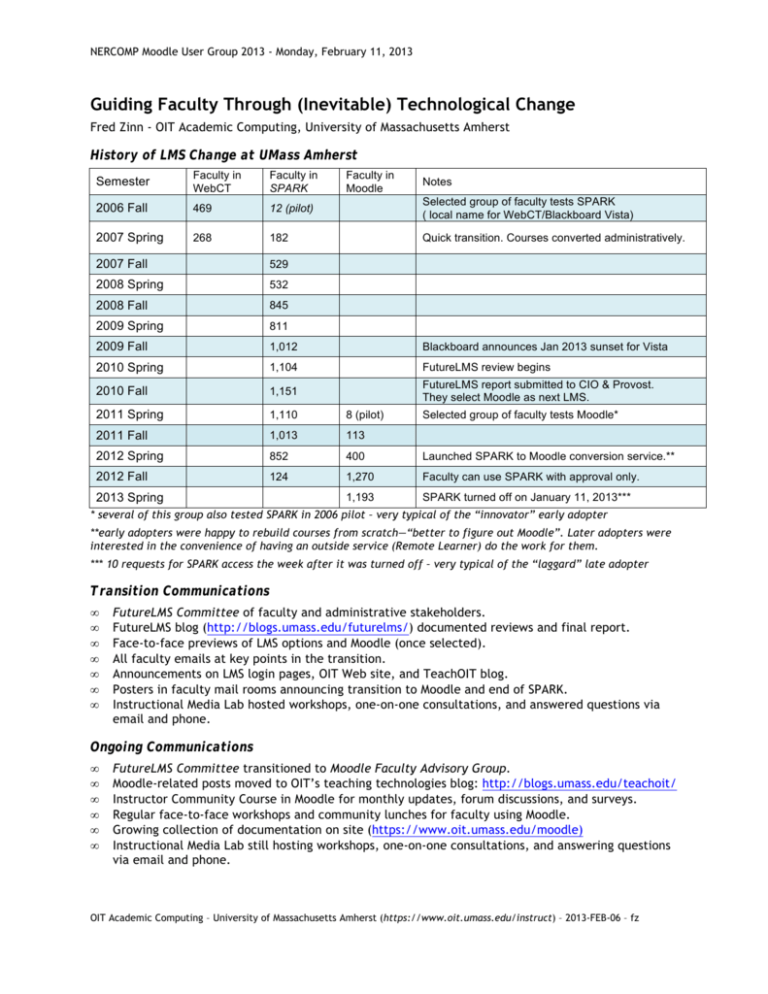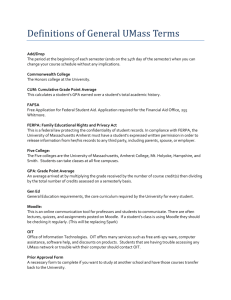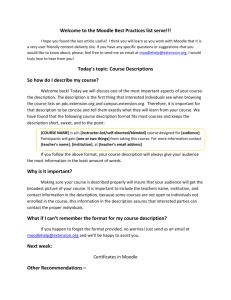(Inevitable) Technological Change - Handout
advertisement

NERCOMP Moodle User Group 2013 - Monday, February 11, 2013 Guiding Faculty Through (Inevitable) Technological Change Fred Zinn - OIT Academic Computing, University of Massachusetts Amherst History of LMS Change at UMass Amherst Semester Faculty in WebCT Faculty in SPARK Faculty in Moodle 2006 Fall 469 12 (pilot) Selected group of faculty tests SPARK ( local name for WebCT/Blackboard Vista) 2007 Spring 268 182 Quick transition. Courses converted administratively. Notes 2007 Fall 529 2008 Spring 532 2008 Fall 845 2009 Spring 811 2009 Fall 1,012 Blackboard announces Jan 2013 sunset for Vista 2010 Spring 1,104 FutureLMS review begins 2010 Fall 1,151 FutureLMS report submitted to CIO & Provost. They select Moodle as next LMS. 2011 Spring 1,110 8 (pilot) 2011 Fall 1,013 113 2012 Spring 852 400 Launched SPARK to Moodle conversion service.** 2012 Fall 124 1,270 Faculty can use SPARK with approval only. 1,193 SPARK turned off on January 11, 2013*** 2013 Spring Selected group of faculty tests Moodle* * several of this group also tested SPARK in 2006 pilot – very typical of the “innovator” early adopter **early adopters were happy to rebuild courses from scratch—“better to figure out Moodle”. Later adopters were interested in the convenience of having an outside service (Remote Learner) do the work for them. *** 10 requests for SPARK access the week after it was turned off – very typical of the “laggard” late adopter Transition Communications • • • • • • • FutureLMS Committee of faculty and administrative stakeholders. FutureLMS blog (http://blogs.umass.edu/futurelms/) documented reviews and final report. Face-to-face previews of LMS options and Moodle (once selected). All faculty emails at key points in the transition. Announcements on LMS login pages, OIT Web site, and TeachOIT blog. Posters in faculty mail rooms announcing transition to Moodle and end of SPARK. Instructional Media Lab hosted workshops, one-on-one consultations, and answered questions via email and phone. Ongoing Communications • • • • • • FutureLMS Committee transitioned to Moodle Faculty Advisory Group. Moodle-related posts moved to OIT’s teaching technologies blog: http://blogs.umass.edu/teachoit/ Instructor Community Course in Moodle for monthly updates, forum discussions, and surveys. Regular face-to-face workshops and community lunches for faculty using Moodle. Growing collection of documentation on site (https://www.oit.umass.edu/moodle) Instructional Media Lab still hosting workshops, one-on-one consultations, and answering questions via email and phone. OIT Academic Computing – University of Massachusetts Amherst (https://www.oit.umass.edu/instruct) – 2013-FEB-06 – fz NERCOMP Moodle User Group 2013 - Monday, February 11, 2013 Questions for Discussion Write down your own answers and discuss them with the people from other institutions around you. How do you get faculty to pay attention? What communication strategies are most successful for your institution’s faculty? How to you get feedback and respond to faculty input? How often do you make changes? What release schedule do you follow? What expectations do you set for faculty at your institution? How do you decide what to change? How do you manage your upgrades? Do you add modules or make your own changes? How are faculty involved in this process? What do you think will come after Moodle? How soon do you think your institution will be evaluating a new LMS (or something completely different)? What do you think will come along that pushes the next major change? Useful References Why Does the Faculty Resist Change? John Tagg, Change, The Magazine of Higher Learning, 2012 http://www.changemag.org/Archives/Back Issues/2012/January-February 2012/facultychange-full.html Change in higher education: Understanding and responding to individual and organizational resistance India F. Lane, Journal of Veterinary Medical Education 34(2):35-92, 2007 http://www.ccas.net/files/ADVANCE/Lane_Change%20in%20higher%20ed.pdf The life cycle of a technology: Why it is so difficult for large companies to innovate Donald A. Norman, 1998 http://www.nngroup.com/articles-life-cycle-of-a-technology/ OIT Academic Computing – University of Massachusetts Amherst (https://www.oit.umass.edu/instruct) – 2013-FEB-06 – fz Excerpted Slides from "Guiding Faculty Through (Inevitable) Technological Change" NERCOMP Moodle User Group, February 2013, Fred Zinn, UMass Amherst, OIT Academic Computing 6/4/13& What is your response when you hear about an new technology or upgrade? Fred Zinn OIT Academic Computing University of Massachusetts Amherst % of the faculty population Want more features, willing to experiment (D. Norman 1998, referencing E.W. Rogers 1962) 40 34 35 40 34 34 30 25 25 20 16 13.5 15 20 16 13.5 15 10 5 34 35 30 10 2.5 2.5 5 0 0 Innovators innovators Early Adopters Early Majority Late Majority early adopters early majority late majority (pragmatists) (conservatives) Laggards Innovators laggards (skeptics) innovators 34 35 34 Early Majority Late Majority Laggards laggards (skeptics) early adopters early majority late majority (pragmatists) (conservatives) LMS Adoption at UMass Amherst Want convenience, reliability, and no hassles 40 Early Adopters 1400 1200 30 25 20 16 13.5 15 1000 800 10 5 600 2.5 0 Innovators Early Adopters Early Majority Late Majority Laggards 400 200 0 2006 Fall innovators early adopters early majority late majority (pragmatists) (conservatives) laggards (skeptics) 2007 Spring WebCT 2007 Fall 2008 Spring 2008 Fall 2009 Spring 2009 Fall 2010 Spring SPARK (WebCT/Blackboard Vista) 2010 Fall 2011 Spring Moodle 2011 Fall 2012 Spring 2012 Fall 2013 Spring Pilots 1&






